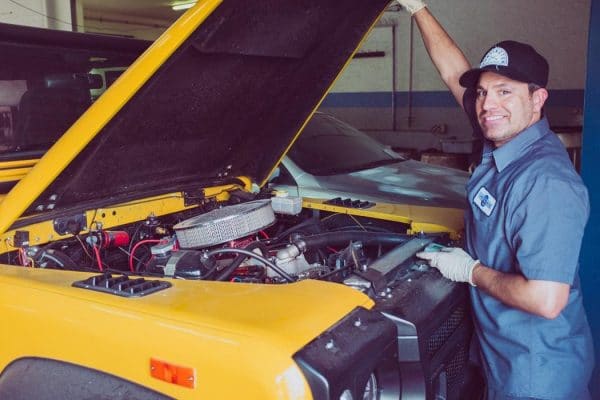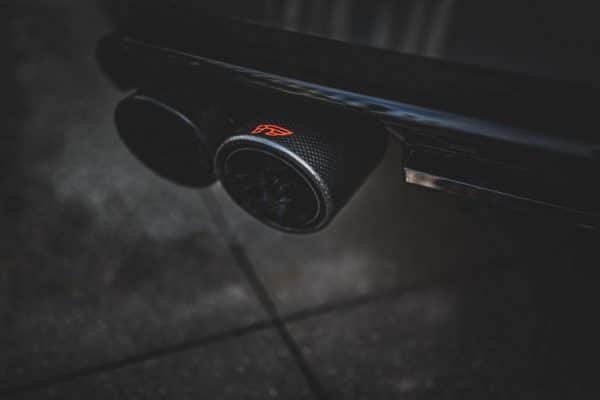When you hear the words “engine misfire,” you probably think of older cartoons. You know. The one where someone is driving a car that pops and sputters wildly and loudly? (Did I just date myself?) And, you might be wondering, will a bad O2 sensor cause a misfire?
Hang tight, and I’ll tell you.
Anyway, an engine misfire is something that can happen in any vehicle.
Which leads to the next thought of, is it dangerous?
And, will I end up like a bad cartoon if I keep driving my RV?
Right Off the Bat

Image via Unsplash
Let’s get something straight before we start taking about o2 misfires. The truth is, you might not even have one in your RV.
First, let me ask you this:
Is your RV gas-powered or is it a diesel?
If your RV has a diesel engine, you might not have an o2 sensor at all. That’s because the fuel injection in a diesel is more controlled and there’s an excess of air as well. That means an o2 sensor to regulate may not be necessary, and likely isn’t necessary or present in your diesel engine.
To be sure, you should take your RV in to be checked if you suspect an engine problem.
Now, if your RV uses gasoline, then it probably does have at least one o2 sensor and the rest of this info will apply to you. But even if you have an RV without an o2 sensor, chances are your tow-behind has one. So, you need to know about them and whether they’ll cause a misfire.
Will a Bad O2 Sensor Cause a Misfire?

Image via Unsplash
In short:
Yes!
A bad O2 sensor can cause a misfire in your engine.
Of course, you might be wondering how will a bad O2 sensor cause a misfire?
Well, the simple answer is that as part of the whole combustion process (the magic that makes your car drive), oxygen mixes with the fuel in your gas tank while the fuel converts to energy.
However, there is an optimal amount of oxygen that should combine with the fuel.
Too much or too little oxygen, and you won’t get the right mix.
Your vehicle will still work with a broken O2 sensor. Vehicles ran for years and years without oxygen sensors.
But, when you don’t have the right oxygen to fuel ratio in your vehicle, not only are you damaging the environment by releasing additional pollutants, you’re damaging your car.
However:
Just because your engine is misfiring, that doesn’t necessarily mean a bad O2 sensor is the cause. There are other things that can cause an engine misfire.
To unmask the culprit, start by figuring out what kind of engine misfire you’ve got.
Is it a “lean” misfire or a constant?
There are two kinds of engine misfires: lean misfires and constant misfires.
Will a bad O2 sensor cause a misfire that’s lean or constant?
Yes. It can cause both. But, what’s the difference?
With a lean misfire, you notice your engine misfires, but only some of the time. And, it seems that you only notice the misfire when the car is idling. As you increase speed, the misfire disappears.
This happens because when you’re idling, the oxygen to fuel ratio is incorrect, causing the misfire. When you accelerate, you change the mix of oxygen to fuel correcting the imbalance.
That’s why the misfire seems to disappear when you accelerate.
In a constant misfire, you notice the misfiring all the time. It doesn’t matter if you’re idling or accelerating or even decelerating. Your engine keeps misfiring.
What Are the Other Symptoms of a Misfire?
If you suspect your engine is misfiring, but you aren’t sure, there are other symptoms that can indicate that you have a problem, even if your “check engine” light isn’t illuminated.
Keep in mind that not only will a bad O2 sensor cause a misfire, but a bad O2 sensor may not necessarily be the cause of your misfire.
Engine pings
A pinging engine sounds like a metal rattle. You’ll likely hear the ping coming from your engine and usually only when you accelerate.
Get this:
While there can be several causes of a pinging engine, the most common cause is that the gas is igniting at the wrong time.
How will a bad O2 sensor cause a misfire like this?
Pinging happens when the combustion process occurs too soon. A failing O2 sensor is sending oxygen to the fuel at the wrong time, causing the misfire.
Rough Idle
When the vehicle is idling, it may not misfire. Instead, you may hear a loud or rough idle.
Or, it might have an irregular idling sound (like it’s trying to accelerate or decelerate even though your foot is on the brake).
You may not be aware that the idle of your vehicle has changed. The sound can make changes over time that you get used too.
But, if someone else mentions the sound your vehicle makes when you’re sitting at the stoplight, you may have engine problems.
Things Smell Rotten
A failing O2 sensor will cause your car to stop burning fuel efficiently. This means that unburned fuel may be sitting in the exhaust system. When that happens, your car will have a rotten egg smell.
Ew!
Or, you may notice a gas smell, but that smell seems to be mixed with the odor of coolant, steam, or even motor oil.
When It’s Not the O2 Sensor
While a failing O2 sensor could be the cause of your misfiring engine, it’s not the only reason this could happen. If you’ve ruled out the O2 sensor (or just aren’t sure), check out some other systems in your car.
The Ignition System
You turn the key (or start it remotely) and your vehicle does nothing. That happens thanks to the ignition system.
When you start your vehicle, you are starting a chain reaction which enables it to move. That chain reaction starts with the ignition system. It’s literally a spark that ignites the gasoline in the tank that starts the fuel burning which powers your engine.
Let’s face it.
The odds are pretty good that you start your RV or tow-behind a lot during the time you own it. And, over time, the ignition system can wear out.
As that happens, your ignition system is less and less able to ignite the spark that makes the vehicle go.
At first, you may not even realize you have a problem. A failing ignition system starts as a small, intermittent misfire — like a lean misfire.
Over time, though, those misfires get more and more noticeable.
If you’re noticing misfires when you’re starting your vehicle, or it seems to have trouble starting, check out your ignition system. That may be the cause of your engine misfires.
The Fuel System

Image via Unsplash
If your fuel system is the cause of the misfire, you’ll likely notice it right away. Misfires caused by the fuel system tend to happen quickly and be constant misfires.
Fuel system misfires are also more likely to happen when you’re idling.
That said, if the fuel system is the cause of the misfire, there are still a number of things that could be the cause.
It could be that the fuel injectors are clogged.
Or, the filter for the fuel system is dirty.
The fuel pump might be failing.
And, it could be one of these things or a combination of these things causing your misfires.
Mechanical Issues
Misfiring caused by a mechanical problem is a little harder to pin down. That’s because there are numerous mechanical breakdowns that could cause engine misfires.
A mechanical misfire is like a constant misfire. You notice it all the time.
Unlike other misfires, it doesn’t go away at higher speeds and tends to get worse over time.
It’s not an easy problem to diagnose. The problem could be anything from the vacuum lines to the gasket to the manifold. It might be from a worn piston ring or a damaged rocker arm.
Something as simple as a slipped timing belt can cause it. But, so can a leak in any of the lines.
If you suspect it’s a mechanical issue causing your misfiring engine, you should take it to a mechanic for an inspection. You can get the code information yourself from the OBD (maybe), but you may still need to take it to a mechanic for repairs.
The Powertrain
When is an engine misfire not an engine misfire?
No, really.
It’s not a joke.
When you’ve got a malfunctioning powertrain.
The powertrain is what allows your car to shift smoothly. If it feels like your vehicle is jerking during acceleration or deceleration (when the gears shift) there’s a chance there’s something failing in the powertrain.
It may feel like an engine misfire, but in actuality, it’s got nothing to do with the engine.
I Can Still Drive It Though, Right?
If you’ve got an engine misfiring for any reason, you can still drive the car. However, you shouldn’t drive your car for too long without a fix no matter what kind of engine misfire is occurring.
Generally, you can safely drive for a few weeks until you can repair the vehicle.
However:
If you continue to drive with a misfiring engine, over time, you will probably damage your vehicle.
Note:
The main concern is that you could cause your engine to fail suddenly. If you’re driving while the happens, you might lose power and could cause an accident.
It’s Better for Everyone
There are many things that can cause your engine to misfire.
Will a bad O2 sensor cause a misfire?
Sure.
But, it also might not be the cause of your misfire. If you’re a diehard DIY mechanic, you may be able to diagnose and fix the misfire on your own.
For the rest of us mere mortals, we’re better off taking our car to a trusted mechanic ASAP. Not only is it better for the car in terms of halting any damage that might occur, but it’s also good for the environment, too.
Because, not only will a bad O2 sensor cause a misfire in your vehicle, it could cause problems with your neighbors.
So, fix your misfiring engine. You’ll be helping your vehicle, the environment, and scoring points in whatever town you land in.
Have you ever had your engine misfire? Was it because of your O2 sensor or something else? Tell us about it in the comments.
Featured Image:via Pixabay